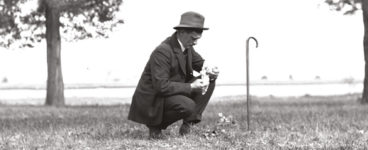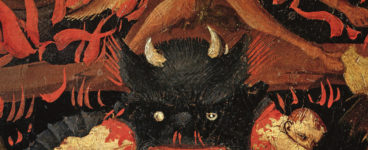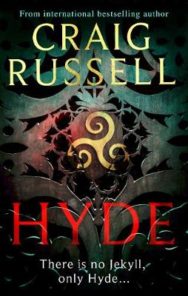‘I think every writer explores the complexities, paradoxes and contradictions of their own cultural and historical background.’
Craig Russell is an internationally-bestselling writer of gothic, psychological thrillers. Next month, his new novel, Hyde, will be published, and in it, he explores one of Scottish literature’s most famous characters. We caught up with with Craig to chat about his favourite books.
Hyde
By Craig Russell
Published by Constable
The book as . . . memory. What is your first memory of books and reading?
Honestly? I can’t remember. Books, reading, the written word were always there as part of my conscious environment. My parents always claimed that I could read well before I went to school, and I remember that I always had books around me. I have the oddest, clearest memory—almost a flashbulb memory—from when I was at primary school: they had the alphabet up on the walls, large black letters against white backgrounds. I can still see, very clearly, the lowercase letter ‘a’ in a sans-serif typeface. I know it sounds bizarre, but I knew instinctively that the letter and the word were part of what defined me. Much in the way I suppose a natural mathematician engages with the number.
When I was very young, I read a story about boy, a Pacific Islander, and his conquest of his fear of the sea. I think it was at that point that I realized that reading was a magical device that allowed you to travel to any place or any time. That, I think, is very much what I try to do now that I’m a novelist. If I can transport myself completely to another time, place and experience, hopefully I can bring along my readers.
The book as . . . your work. Tell us about your latest book Hyde. What did you want to explore in writing it?
Hyde is set in Victorian Edinburgh and combines all the elements that excite me personally: conflicting senses of identity, psychology, history, myth and legend. I think every writer explores the complexities, paradoxes and contradictions of their own cultural and historical background.
Hyde isn’t a retelling of Stevenson’s tale. If anything, it’s more of an origin story. Just as Robert Louis Stevenson based the character of Long John Silver on his one-legged friend William Henley, I have suggested that the combined character of Jekyll and Hyde were based on a real acquaintance of Stevenson. My Hyde—Captain Edward Henry Hyde—is superintendent of detective officers of the City of Edinburgh Police. He keeps secret from all but his physician that he suffers from ‘lost time’—periods during which he cannot account for his actions—and is plagued with dark dreams that emerge him in a fantastical landscape populated with figures and monsters from Celtic mythology. With no memory of how he got there, Hyde finds himself at the murder scene of an unknown man, found hanging upside-down above the Water of Leith, a victim of the ancient Celtic three-fold death ritual. He starts to investigate the murder, worried that he himself should be a suspect.
Hyde is heart and soul a dark, gothic thriller, but it is woven through with dualities of all sorts, including Edinburgh’s split-personality (which was the true inspiration of Stevenson’s tale, even if he did set it in London). Hyde also allowed me to interrogate the Scottish sense of self at the zenith of the British Empire. It’s a very different book from The Devil Aspect, but it allowed me to delve back into some of the same Jungian concepts of the role of myth in our sense of identity, and the archetypes that haunt both our dreams and our legends. All of which allowed me to ratchet up the psychological horror.
The book as . . . inspiration. What is your favourite book that has informed how you see yourself?
God, that’s difficult! I would find it difficult to single out a single book. But, if I had to, I think it would be Nineteen Eighty-Four by George Orwell.
The book as . . . a relationship. What is your favourite book that bonded you to someone else?
My first novel, Blood Eagle. My wife and I already had a successful freelance writing business and I rather timidly suggested I wanted to devote time to writing a novel. Her enthusiasm and support was total and I honestly don’t know if I would have stuck with it without her encouragement.
The book as . . . object. What is your favourite beautiful book?
I love beautifully crafted books and I have a collection of Folio Society editions. My favourite, however, would be an heirloom: my copy of Gulliver’s Travels from 1898. My grandmother was awarded it as a school prize, and she gave it to me when I was a child. It’s filled with wonderful illustrations by A.M. Sargent.
The book as . . . rebellion. What is your favourite book that felt like it revealed a secret truth to you?
A combination, in totally contradictory ways, of Nineteen Eighty-Four by George Orwell and The Roads to Freedom trilogy by Jean-Paul Sartre. I read them both when still young and they helped form my political consciousness. I think outsider fiction influenced me greatly and all my protagonists tend to be outsiders, to varying degrees.
The book as . . . entertainment. What is your favourite rattling good read?
Again, this is a tie. The Thirty-Nine Steps by John Buchan and Figures in a Landscape by Barry England. Both pursuit thrillers where the landscape is as much character as setting.
The book as . . . a destination. What is your favourite book set in a place unknown to you?
When I was a teenager, I read all the Russians. And, of course, at that time, Russia was behind the Iron Curtain, and a land and culture in shadow. I read Dostoyevsky, some Tolstoy, all the short stories of Anton Chekhov, and graduated to the social realism of Mikhail Sholokhov—but, above them all, was Nikolai Gogol, whose work I loved. Unable at that time to visit Russia, I built an image of the land and its people. I think my favourite book would have to be The Diary of a Madman and Other Stories.
The book as. . .education. What is your favourite book that made you look at the world differently?
I honestly think that if a book doesn’t challenge one’s view of the world, of oneself, then it isn’t worth reading. There have been so, so many. One of my main literary influences and favourite reads is Heinrich Böll. His style was very simple and direct, yet so powerful. It would have to be a toss-up between his Collected Short Stories and The Lost Honour of Katharina Blum.
The book as. . .technology. What has been your favourite reading experience off the page?
Oh. I’m very last century. Or maybe even century-before-last. Everything I read tends to be physical books. Although I do love audiobooks … I recently listened to the late Anthony Valentine’s narration of Dracula … great stuff.
The book as . . . the future. What are you looking forward to reading next?
The Bridge at Andau by (a very young) James Mitchener. It was recommended to me by Frank Darabont (the writer/director of The Shawshank Redemption and The Green Mile), whose parents fled the 1956 Soviet crackdown in Hungary. Frank knows I wrote Dead Men and Broken Hearts against the background of the Hungarian Uprising and highly recommended Mitchener’s nonfiction book. I’m really looking forward to it.
Hyde by Craig Russell is published by Constable, priced £16.99.
ALSO IN THIS ISSUE

 Will Purdom, (1880-1921), Trade Unionist, Botanist and Ecologist
Will Purdom, (1880-1921), Trade Unionist, Botanist and Ecologist
‘Will Purdom was a fine and honourable man, who rose from a position of very limited personal agency …

 The Satanic in Science Fiction and Fantasy
The Satanic in Science Fiction and Fantasy
‘He is synonymous with bloody sacrifice, scheming, false idols, lies, cunning tests, death and bruta …













